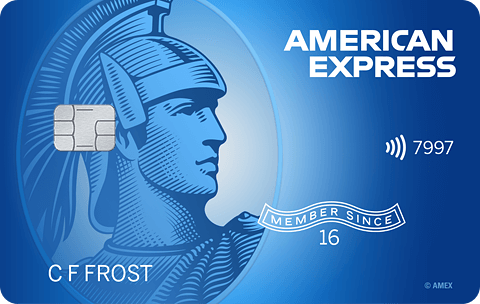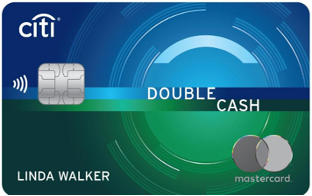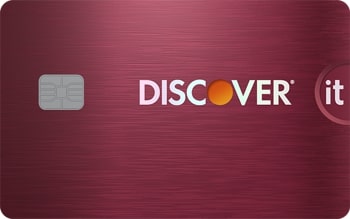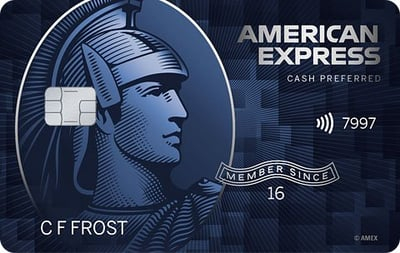AmEx Blue Cash Everyday Review: Solid Cash Back, $0 Annual Fee
The Bottom Line
4.9
If groceries, gas and online shopping are significant parts of your budget and you refuse to pay an annual fee, this card is a fine choice.
Nerdwallet best-of awards

Nerdwallet best-of awards

Rates, fees and offers
Rates, fees and offers
Annual fee
$0
Rewards rate
1%-3%
Bonus offer
Earn a $200 statement credit after you spend $2,000 in purchases on your new Card within the first 6 months. Terms Apply.
Intro APR
0% intro APR for 15 months on purchases and balance transfers
Ongoing APR
APR: 19.49%-28.49% Variable APR
Cash Advance APR: 28.74%, Variable
Penalty APR: 29.99%, Variable
Balance transfer fee
Either $5 or 3% of the amount of each transfer, whichever is greater.
Foreign transaction fee
2.7% of each transaction after conversion to US dollars.
More details from American Express
More details from American Express
- Earn a $200 statement credit after you spend $2,000 in purchases on your new Card within the first 6 months.
- No Annual Fee.
- Enjoy 0% intro APR on purchases and balance transfers for 15 months from the date of account opening. After that, 19.49% to 28.49% variable APR.
- Plan It®: Buy now, pay later with Plan It. Split purchases of $100 or more into equal monthly installments with a fixed fee so you don’t have the pressure of paying all at once. Simply select the purchase in your online account or the American Express® App to see your plan options. Plus, you’ll still earn rewards on purchases the way you usually do.
- Earn 3% cash back at U.S. supermarkets, 3% cash back on U.S. online retail purchases, 3% cash back at U.S. gas stations, on eligible purchases for each category on up to $6,000 per year in purchases (then 1%). Cash back is received in the form of Reward Dollars that can be redeemed as a statement credit and at Amazon.com checkout.
- Get up to a $7 monthly statement credit after using your enrolled Blue Cash Everyday® Card for a subscription purchase, including a bundle subscription purchase, at Disneyplus.com, Hulu.com, or Plus.espn.com U.S. websites. Subject to auto-renewal.
- Apply with confidence. Know if you're approved for a Card with no impact to your credit score. If you're approved and you choose to accept this Card, your credit score may be impacted.
- Terms Apply.
Pros and Cons
Pros
No annual fee
High rewards rate
Intro APR period
Bonus categories
Cons
Requires good/excellent credit
Spending caps on bonus rewards
Detailed Review
If you spend a lot at the grocery store, the gas pump and online — and can't stand the idea of paying an annual fee on a credit card — the Blue Cash Everyday® Card from American Express may be calling your name the same way it did mine.
For a $0-annual-fee card, it pays an excellent 3% cash-back rate at U.S. supermarkets, U.S. gas stations and U.S. online retail purchases. You’ll earn that 3% rate on the first $6,000 in spending per year in each of those three categories. All other purchases (including above the $6,000 cap in the categories) earn 1% cash back. Terms apply.
The card is frequently compared with its sibling, the Blue Cash Preferred® Card from American Express, which is perhaps the ultimate gas and groceries card. It has a $0 intro annual fee for the first year, then $95. In exchange, it offers some of the highest rewards rates of any cash-back card.
I chose the Blue Cash Everyday® Card from American Express in 2018, when I decided to focus more on cooking at home and knew I would be spending more money on groceries. This rewards category was the main selling point for me. Solid rewards on gas — and a nice welcome offer — were the sprinkles.
When you compare the Blue Cash cards head to head, the pricier Preferred will come out on top for many households, but that doesn't mean the Everyday can't hold its own against its fellow AmEx or the rest of the cash-back competition. It all comes down to how you spend.
Blue Cash Everyday® Card from American Express: Basics
To view rates and fees of the Blue Cash Everyday® Card from American Express, see this page.
Basic features
Card type: Cash back.
Annual fee: $0.
Bonus offer: Earn a $200 statement credit after you spend $2,000 in purchases on your new Card within the first 6 months. Terms Apply.
Rewards:
3% back* at U.S. supermarkets on up to $6,000 spent per year.
3% back at U.S. gas stations on up to $6,000 spent per year.
3% back on U.S. online retail purchases on up to $6,000 spent per year.
1% back on other purchases.
Terms apply.
Interest rate: 0% intro APR for 15 months on purchases and balance transfers, and then the ongoing APR of 19.49%-28.49% Variable APR.
Other benefits:
Up to $84 a year in credit for a subscription to Disney streaming subscriptions, in the form of $7 monthly statement credits. Enrollment required; terms apply.
Compare to Other Cards

Benefits and Perks
Supermarket rewards
Getting 3% back on your U.S. supermarket spending is a nice return on a potentially big portion of the household budget. It essentially means getting a discount on all the food, paper goods, personal care products and other items you buy regularly at the grocery store. Terms apply.
Rewards are based on where you’re shopping — in this case, U.S. supermarkets — not what you buy there. American Express’ definition of U.S. supermarkets excludes wholesale clubs such as Costco and Sam’s Club, superstores like Target and Walmart, specialty food stores and others. So consider not only how much you spend on groceries but also where you most often buy them.
The 3% rewards rate applies to the first $6,000 in U.S. supermarket spending annually. That’s generous for a rewards spending cap. Maxed out, it’s worth $180 annually in bonus cash back. But it’s still a cap — one a family could blow through before the year is done.
I primarily use the Blue Cash Everyday® Card from American Express to cover gas and groceries every month. Sticking mostly to these purchases allows me to keep an eye on my budget in these categories. To stay on track, I have a certain balance I allow for gas and groceries every month. I also pay off the balance in full every month to avoid the card’s interest charges.
I use the card’s AmEx Offers to squeeze even more incentives from this card. I’ll browse the offers to see whether there are any merchants I already typically spend with, and I activate offers to stack rewards on top of the cash back I already earn with the card.
Gasoline rewards
A 3% cash-back rate at U.S. gas stations is competitive, but restrictions apply here, too.
The $6,000 annual spending cap could limit your earnings if you put a lot of miles on your car. Also, higher gas rewards are available only at traditional gas stations. Warehouse clubs, superstores and supermarkets that sell gas don’t count, according to American Express. American Express maintains a list of examples of qualifying stations.
Online retail purchase rewards
If you make most of your purchases without leaving home, the Blue Cash Everyday® Card from American Express earns a respectable 3% cash back when you shop online, on up to $6,000 in spending per year. Goods bought through a retailer’s website or app are eligible to earn 3% back. But paying for services online doesn’t count toward this category. According to American Express, “services” means purchases such as travel bookings and online food delivery.
Personally, I don’t do much shopping online outside of Amazon, so I probably don't get as much value out of this category as others might. But it's certainly nice to have.
Bonus offer
The Blue Cash Everyday® Card from American Express comes with a bonus offer for new cardholders: Earn a $200 statement credit after you spend $2,000 in purchases on your new Card within the first 6 months. Terms Apply. That’s a nice incentive that I was able to use to offset the cost of a large purchase at the time. In my case, it was a fancy new blender to keep my cooking and health goals in line.
MORE NERDY PERSPECTIVES
 | If you're getting this card primarily for its benefits on groceries, do the math to make sure you wouldn't actually do better with the Blue Cash Preferred, which charges an annual fee but pays higher rewards at U.S. supermarkets. Paul Soucy, content director, credit cards and travel rewards |
 | I mostly use this card to budget for specific categories like gas and groceries. One underrated feature is Amex Offers. They aren’t unique to this card, but they can provide a lot of value if you get offers for those expenses you already make. Melissa Lambarena, writer, credit cards |
 | The Blue Cash Everyday earns bonus rewards at U.S. supermarkets, gas stations and U.S. online retailers — three categories that are big budget items for many households. The online retailer category can be especially useful. ... What family isn’t placing at least one Amazon order a month? The Blue Cash Everyday also comes with useful credits toward Disney+ and HomeChef. Tip: HomeChef offers a “heroes” discount for people in certain occupations, which would stack with the monthly credit from the Blue Cash Everyday. Jae Bratton, writer, credit cards |
 | This is an excellent all-around cash-back credit card, but make sure you're OK getting your "cash back" only as a statement credit (aka "Reward Dollars," in AmEx terms). If not, other cash-back cards will grant you more flexibility with your rewards. Kenley Young, editor, credit cards |
An introductory 0% APR
The card offers a long interest-free window for new cardholders who qualify. Back when I opened the card, I took advantage of this window to free up my cash flow and keep building up my savings bucket. I would slowly pay off a bit at a time to give myself some breathing room on some purchases. I also only charged what I knew I could afford to pay off within the promotional period.
Drawbacks and Considerations
Blue Cash vs. Blue Cash
A primary consideration with the card is deciding whether you should instead apply for the Blue Cash Preferred® Card from American Express, which comes at a price. It has a $0 intro annual fee for the first year, then $95. That's steep for a cash-back card, but in exchange, you'll get an extensive suite of benefits that can be really lucrative for road warriors and home chefs.
So when is the annual-fee card a better deal? The easiest way to compare the Blue Cash cards is to look at grocery spending alone. If you spend at least $61 per week at U.S. supermarkets, you’ll earn more with the Blue Cash Preferred® Card from American Express, even after the annual fee. Our comparison of the two Blue Cash cards goes into more detail and includes a calculator for comparing rewards.
| Empty Table Header | Blue Cash Preferred® Card from American Express | Blue Cash Everyday® Card from American Express |
|---|---|---|
U.S. supermarkets | 6% (on up to $6,000 a year in spending) | 3% (on up to $6,000 a year in spending) |
Select U.S. streaming subscriptions | 6% | 1% |
U.S. gas stations | 3% | 3% (on up to $6,000 a year in spending) |
Transit (including taxis, rideshares, parking, tolls, trains and buses) | 3% | 1% |
U.S. online retail purchases | 1% | 3% (on up to $6,000 a year in spending) |
All other purchases | 1% | 1% |
see rates and fees | see rates and fees |
If you don’t spend enough on groceries or some combination of other bonus categories to justify paying an annual fee, the best alternative might be a step down to the Blue Cash Everyday® Card from American Express.
A "flat-rate" card that pays the same rewards on all spending might also be a better fit.
For example, a $0-annual-fee alternative is the low-hassle Wells Fargo Active Cash® Card, which pays 2% cash back on all purchases with no spending categories to remember. It also offers a sign-up bonus for new card holders.
Or consider the generous 5% rotating bonus rewards categories of the Chase Freedom Flex® and Discover it® Cash Back, which have in the past included grocery stores and gas stations. The 5% cash back rewards on these cards apply up to a $1,500 quarterly spending maximum, and you have to activate the categories each quarter. All other purchases on the cards get 1% back. If you want something a little simpler, consider the Bank of America® Customized Cash Rewards credit card. It offers 3% cash back on the spending category of your choice, which includes gas as an option, and 2% on groceries. (With these cards, the amount of spending eligible for bonus rewards is capped; click through to their pages for details.)
Less ideal for international travel
The card is not ideal to use abroad because acceptance internationally lags Visa and Mastercard, and it charges a 2.7% fee on international purchases. Some cards charge no foreign transaction fee.
You can learn more about cash-back credit card alternatives by visiting NerdWallet's list of the best credit cards to have.
How To Decide If It's Right For You
The Blue Cash Everyday® Card from American Express offers good, relevant cash-back rewards that could match your needs if your spending at U.S. supermarkets isn't high enough to justify applying for the Blue Cash Preferred® Card from American Express — or if you’re looking to earn solid rewards on gas and online purchases.
To view rates and fees of the Blue Cash Everyday® Card from American Express, see this page. To view rates and fees of the Blue Cash Preferred® Card from American Express, see this page.
*Cash Back is received in the form of Reward Dollars that can be redeemed as a statement credit or at Amazon.com checkout.
BIg-time grocery and gas rewards, for a fee
There's a $0 intro annual fee for the first year, then $95. If you spend more than $61 a week on groceries, you'll get more value out of this card. You get a whopping 6% cash back at U.S. supermarkets, on up to $6,000 a year in spending (then 1%); 6% cash back on select U.S. streaming subscriptions; 3% cash back at U.S. gas stations and on transit (including such things as taxis, rideshares, parking, tolls, trains and buses); and 1% cash back on all other purchases. (Terms apply.)
Looking For Something Else?
Methodology
NerdWallet reviews credit cards with an eye toward both the quantitative and qualitative features of a card. Quantitative features are those that boil down to dollars and cents, such as fees, interest rates, rewards (including earning rates and redemption values) and the cash value of benefits and perks. Qualitative factors are those that affect how easy or difficult it is for a typical cardholder to get good value from the card. They include such things as the ease of application, simplicity of the rewards structure, the likelihood of using certain features, and whether a card is well-suited to everyday use or is best reserved for specific purchases. Our star ratings serve as a general gauge of how each card compares with others in its class, but star ratings are intended to be just one consideration when a consumer is choosing a credit card. Learn how NerdWallet rates credit cards.
Frequently asked questions
How does cash back work on the Blue Cash Everyday from American Express?
How does cash back work on the Blue Cash Everyday from American Express?
This card pays 3% cash back on up to $6,000 a year in spending in each of these three categories: at U.S. supermarkets, U.S. gas stations and U.S. online retail purchases. After you hit the $6,000 cap in any of these categories, you earn 1%. Other purchases earn 1% cash back. Terms apply.
Should I get this card or the Blue Cash Preferred?
Should I get this card or the Blue Cash Preferred?
The Blue Cash Preferred® Card from American Express offers higher cash-back rewards — as high as 6% — but it has an annual fee: $0 intro annual fee for the first year, then $95. A good guideline: If you spend more than $61 a week at U.S. supermarkets, you’ll come out ahead with the Blue Cash Preferred® Card from American Express, even after paying the annual fee. For a more detailed breakdown, use the calculator in our comparison article.
What is the annual fee on the AmEx Blue Cash Everyday?
What is the annual fee on the AmEx Blue Cash Everyday?
The annual fee is $0.
Does the Amex Blue Cash Everyday have a bonus offer for new cardholders?
Does the Amex Blue Cash Everyday have a bonus offer for new cardholders?
Yes. The welcome offer for new cardholders is: Earn a $200 statement credit after you spend $2,000 in purchases on your new Card within the first 6 months. Terms Apply.
What credit score do I need to get the Amex Blue Cash Everyday?
What credit score do I need to get the Amex Blue Cash Everyday?
You’ll need at least good credit to qualify for the Blue Cash Everyday® Card from American Express. But a credit score alone isn’t enough to qualify for any credit card. Issuers take into account your income, existing debts and other information.
About the author

Melissa Lambarena
Senior Writer & Content Strategist


